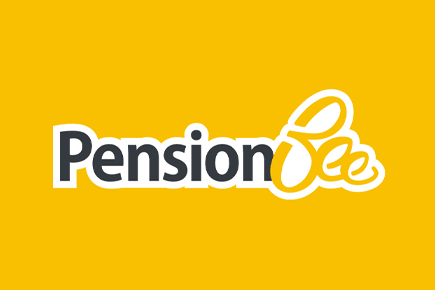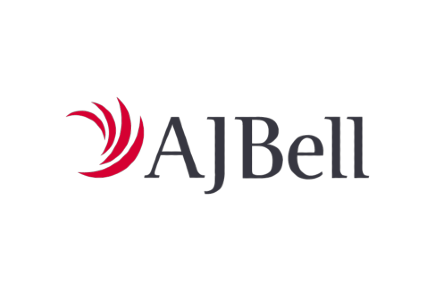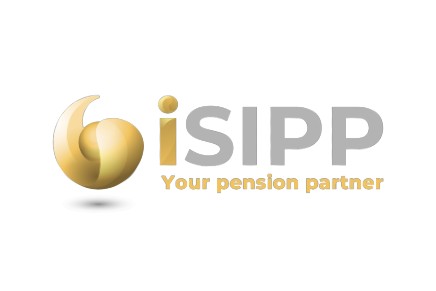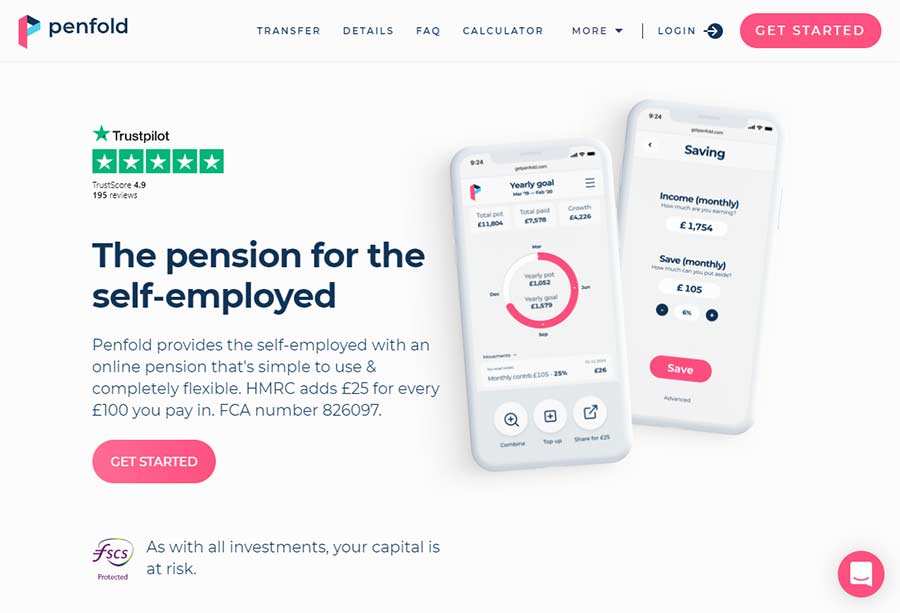As an IT contractor, saving for your retirement is solely down to you, however, there is great pension tax relief that you can take advantage of when making pension contributions so it is definitely worth taking the time to give your pension planning some careful consideration.
In this guide, I have taken the time to outline all your options, so you can start taking advantage of one of the few remaining tax breaks and ultimately maximise your IT contract pension pot.
Also consider: Find the Best Pension Private Pensions Providers
Best IT contractor pensions for July 2024
Here is my list of the best pensions for IT contractors in the UK. Please review each provider before making a decision on which one is best for your needs.
Best IT Contractor Pensions at a glance
Pensionbee
- Best for the self-employed
- Contribute as much or as little as you like, as often as you like
- Fees: 0.28% up to 0.95%
AJ Bell
- Free to open a SIPP and transfer in an existing pension
- Buy investments from just £1.50
- Fees start at just 0.25%
Interactive Investor
- SIPP costs £12.99 a month
- Free to join and free to leave
- Trading costs: £7.99 for UK shares and ETFs, funds, investment trusts and US shares
iSIPP
- Best for Contractors
- Investment Options: DIY & Ready-made
- 20 years’ experience as pension administrators
Capital at risk.
Penfold Pensions
- Choose plans including Lifetime, Standard, Sustainable and Sharia
- Reduce your corporation tax bill by up to 19%
- Fees: 0.75% up to £100k – 0.4% over £100k
Bestinvest
- Minimum combined value of pensions – £10,000
- Ready-made portfolio fees from 0.2%
- Over 3,000+ funds, shares and ETFs available
Hargreaves Lansdown
- Investment Options: DIY & Ready-made
- Annual Fee: 0.1% – 0.45%
- Min. Investment: £100 lump-sum or £25 a month
Moneyfarm
- Investment Options: Ready-made
- Annual Fee: 0.35% – 0.75%
- Min. Investment: £500
Netwealth
- Free consultation with qualified adviser – to maximise your retirement potential
- Consolidate your pensions into a cost-effective, fully managed and flexible personal pension
- Get the best of tech + an expert team to get the retirement you deserve
- Best IT contractor pensions for July 2024
- Do Contractors Get a Pension?
- Can My Limited Company Pay Into My Pension?
- How Tax Relief Works For You
- Tax Calculations for Contractor Pensions
- Tax Relief if Paying Through Your Limited Company
- Making Large One Off Pension Contributions
- Choosing the Right Time to Start a Pension
- Available Pensions For Self Employed People
- Stakeholder Pensions
- Self Invested Personal Pension (SIPP)
- Consolidating Existing Pensions
- Should You Engage the Services of a Financial Advisor?
- What is the Best Pension for Self Employed Contractors?
- Best Personal Pension Providers for Experienced Investors
- Best personal pension providers for ready-made funds
- Accessing Your Pension At Retirement
- Frequently Asked Questions
Do Contractors Get a Pension?
Unlike employees who are automatically enrolled into their employer’s company pension with handsome pension contributions from their employer, as a contractor, the onus is on you to ensure you have adequate retirement savings.
Auto-enrolment does not apply to contractors, even if you are working through your own limited company. This means you will need to familiarise yourself with the pension options that are available, select the best one for you, and identify the optimum contribution levels to help you achieve the retirement that suits you.
Can My Limited Company Pay Into My Pension?
The answer is yes, however, whether or not this is the avenue you should explore is another question. Should you decide to set up a workplace pension for yourself, from your limited company, you will need to adhere to the following minimum pension contributions:
- 3% of your qualifying earnings from your limited company
- 4% of your personal income
Qualifying earnings are represented by your company’s total annual income, minus any dividends.
Whilst this is a perfectly acceptable way for you to pay into a pension, as a contractor working through your own limited company, you can inform the Pension Regulator that you are exempt from automatic enrolment and choose to pay into a personal pension, outside of your limited company.
The reason most people would have for choosing this option is the great flexibility you get from a personal pension. Within the workplace pension, you and your company are forced to pay in the minimum contribution each month, regardless of any changes to your income. The other consideration is that your pension will automatically be part of a workplace scheme, giving you less choice on the investments you may wish to consider.
How Tax Relief Works For You
How you benefit from the generous pension tax advantages available on contractor pensions will depend on whether you are paying into private pensions, or whether you pay into a workplace pension through your limited company. Ultimately we all want to make our contractor pensions as tax efficient as possible and receive tax relief at the best rate available, and therefore it is worth taking a moment to discover which of these options would be best suited to your circumstances.
Tax Calculations for Contractor Pensions
Should you decide to avoid auto-enrolment pension and save into a personal pension instead, then it’s important to understand how the tax relief works for you. The tax relief you are entitled to will depend on the rate of tax you currently pay. For basic rate taxpayers, the government will pay an additional 20% on any pension contributions you make from your own personal funds. Therefore, should you pay £100 into your pension from your personal funds, the government will add an additional £20, bringing the total contribution to £120.
For higher rate taxpayers, the government contribution is increased to 40%, meaning that for every £100 of personal contributions into your pension, the government will contribute a further £40, bringing your total contribution to £140.
This government contribution is capped at 100% of your total salary or £40,000 a year, whichever is the lowest. Whilst pension contributions into your private pension within the personal limits are tax-free, any pension contributions that you make over and beyond this amount will be taxed at your marginal rate.
Tax Relief if Paying Through Your Limited Company
Whilst a pension can attract personal tax relief, the majority of limited company contractors choose to make their pension contributions through their limited company, as this can offer the greatest tax relief. If you have opted to take out a workplace pension through your limited company, then the tax calculations are changed significantly. This is due to the fact that pension employer contributions made through your limited company are considered an allowable business expense, and therefore not subject to corporation tax and could save tax up to 19% on your corporate tax bill. In addition to this you will save a further 40% on your income tax (assuming you are in the higher rate tax bracket).
You could also stand to save a further 13.8% in employer National Insurance Contributions.
The other major tax savings for limited company contractors saving a pension through your limited company is that employer pension contributions are not limited by the size of your salary. This means that whilst your personal pension contributions will not be able to exceed your salary, your company pension contributions are limited only by the annual allowance which currently stands at £40,000. If like many IT contractors, you are taking your salary in the form of dividend income in order to take advantage of the more favourable dividend tax, and have a small, taxable income as a result, you can still contribute a substantial amount into your pension whilst also saving on income tax, national insurance, and corporation tax.
Making Large One Off Pension Contributions
As an IT contractor, you may be more comfortable making large pension contributions that sit more comfortably with your income rather than monthly contributions. The good news is that thanks to ‘carry forward’ rules, any unused pension allowances from the past three tax years can be utilised to make large, one-off contributions. That means that you can deposit up to £120,000 in one go, provided you have been registered in the pension scheme for the duration of the years in question.
Choosing the Right Time to Start a Pension
The best time to start a pension is yesterday. The sooner you start saving into a pension fund, the better, however, it is never too late.
Sadly only about 50% of IT Contractors are currently saving into a pension, and there is little being done to rectify this. However, saving into a pension is one of the best ways to grow your wealth, taking advantage of the government bonus, plus investments, and with the added benefit of compounding, even small pension contributions can become significant amounts over time.
Of course, the younger you are when you start saving into a pension, the less you will need to contribute monthly. The general rule of thumb is that you should half your age when you start saving, and that is the percentage of your salary that should be saved into a pension pot. Therefore a 20-year-old will only be saving 10% of their salary into their pension fund, whereas someone who starts their pension savings at 40 will need to part with 20% of their salary to achieve a similar pension pot amount when they reach retirement.
The other advantage of saving when young is that you have enough time in the market to engage with higher-risk investments which can often be higher-yielding. The reason for this is a young investor has more time to ride out any volatility in the market. Older investors are always advised to take a more cautious approach which is often less lucrative.
Available Pensions For Self Employed People
Getting your pension scheme right the first time is an important part of the pension process. As an IT Contractor, you will have certain requirements that need to be met such as having the flexibility to contribute as much or as little as you like in line with your changing income.
The other major considerations are the fees and charges at the pension scheme you are considering. High fees can soon start to eat away at your investment gains, and the fees charged from one pension provider to another can vary in amount and structure. It’s therefore important to find a pension provider that suits your unique circumstances.
The investment opportunities presented by each pension scheme are another factor that requires careful consideration. You may have certain moral or religious requirements on how you would like your money invested, or you may just be looking for funds that have performed well historically.
There is also the question of how much of an active role you would like to take in investing your money. Some pension schemes will allow you to pick and choose all your own investments, while others have more of a ‘set it and leave it’ type approach whereby your investments are managed by professionals.
Given the greater flexibilities surrounding how you access your pension when the time comes to retire, you may also want to consider what your pension scheme has in place in terms of drawdown.
You should also ask yourself if you have any pensions already in existence. A surprising number of people have old workplace pensions that they have forgotten about and which could perform better should they be consolidated into one, well-managed pension fund.
Stakeholder Pensions
Stakeholder pensions offer contractors a quick, easy, and flexible way to save. Stakeholder pensions are defined contribution, meaning as a pension saver you can pay money into a pot, and that money is then invested on the stock market. With stakeholder pensions, you won’t get much choice on how your pension funds are invested, as they tend to provide a generic solution that suits most people.
A stakeholder pension will often be a low-cost solution, with low minimum pension contributions. Costs for this sort of pension will fall in the range of 1.5% for the first 10 years and 1% after that.
Self Invested Personal Pension (SIPP)
SIPPs share many of the features of a stakeholder pension, with a few key differences. Firstly the range of investment opportunities within a SIPP is often much wider and as the pension holder, you are able to choose your investments yourself. Whilst SIPPs traditionally required a lot of management from the pension holder, there are now online SIPPs available where the level of interaction is minimal and they, therefore, require little to no investment expertise.
The major advantage of a SIPP is they are a low-cost option, depending on the provider you select. With SIPPs, you are often required to select the appropriate level of risk for your circumstances, unlike stakeholder pensions which are generally low risk.
If you are still on the fence regarding whether a stakeholder pension or SIPP would be the most appropriate option for you, then I would recommend you consult with a financial adviser who can recommend the best third-party pension providers to meet your needs.
See also: My guide to the pros and cons of investing in SIPPs
Consolidating Existing Pensions
If you have been employed previously, it’s likely you have an auto-enrolment pension still in existence. If you have previously had several different jobs, then you may still have several old pensions. Consolidating all these small pensions into one larger pot is a great way to save on fees and can help you manage your investments with greater efficiency.
 There are two ways to effectively consolidate your pensions. A financial adviser will be able to help you locate all your old pensions and move them into one, efficient pension scheme in order to maximize your returns.
There are two ways to effectively consolidate your pensions. A financial adviser will be able to help you locate all your old pensions and move them into one, efficient pension scheme in order to maximize your returns.
Alternatively, you can engage the services of an online pension consolidation service, such as is offered at PensionBee, which will help you locate all your pensions and move them across to their platform on your behalf.
Before you consider consolidating all your existing pensions, you should check the details of your old pension plans, and any associated costs you may incur by moving them all to one provider. Be aware of any final salary pensions you may have in place as these will require careful consideration.
Should You Engage the Services of a Financial Advisor?
Ensuring you have an adequate retirement income is critical in order to guarantee you can enjoy your retirement years, free from financial burden. A financial adviser will be able to take into account your unique circumstances, time frames, how much you will need to enjoy a comfortable retirement, and your appetite for risk in order to put a robust plan in place that takes advantage of all the benefits available to you. They will recommend the best pension product for you as an individual.
The obvious downside should you decide to seek professional advice, is the associated cost. There are now online platforms that can offer you a similar service, albeit less personalised, so you can plan for your retirement yourself. Whether you decide to take financial advice is a very personal decision.
Get a FREE Pension Review
Get a free no obligation pension review today from a qualified financial adviser.
Our partner Unbiased will connect you with one of over 27,000 FCA-regulated advisers.
What is the Best Pension for Self Employed Contractors?
As a pension is almost always invested in order to grow your pot for your retirement, finding the best pension for you will largely depend on your investment knowledge and experience as well as how much time you can dedicate to taking care of your investments.
We also have a guide on the the best pension providers for the self employed available to read.
Therefore I have split the best providers online into two main camps – best personal pensions providers for experienced investors and best personal pension providers for ready-made funds. The latter will allow you to adopt a ‘set it and leave it’ type investment style, whereby the fund you invest in is maintained and adjusted over time in line with fluctuations to the marketplace, allowing you to take a hands-off approach.
Best Personal Pension Providers for Experienced Investors
If you feel your investment knowledge is up to the challenge of managing your own investment portfolio then I have selected the following providers, who present a simple, low-cost solution, whilst providing you with an impressive range of investment opportunities. It is important to take into consideration the size of your pension pot when ascertaining the most cost-effective solution for you. Larger pension pots will often find a flat monthly fee a more appealing solution, whereby smaller pots will benefit more from a percentage fee.
| Provider | Account Fee | Buying and selling shares | Fractional shares? | FX rate | Transfer out fee |
|---|---|---|---|---|---|
| Freetrade | £9.99 pcm | FREE | Yes | Spot rate +0.45% | FREE |
| Hargreaves Lansdown | 0.45% | £11.95 | No | Spot rate + 1% | FREE |
| Interactive Investor | £12.99 pcm | £7.99 | No | Spot rate + 1.5% | FREE |
| AJ Bell Youinvest | 0.25% | £9.95 | No | Spot rate + 1% | £9.95 |
Best personal pension providers for ready-made funds
The providers I have selected below have been picked out mainly for their ease of use, flexibility, and low-cost solution. Within these options, you can set up an account in a moment, pick the fund you feel is best suited to your investment style and or risk appetite, and leave the rest to the platform to manage.
| Provider | Platform Fee | Fund Cost | Transfer Out |
|---|---|---|---|
| Pension Bee | 0.5% – 0.95% | 0.03% transaction cost | FREE |
| Penfold | 0.75% | FREE | FREE |
| Moneybox | 0.45% | 0.13% – 0.25% fund provider cost | FREE |
| Moneyfarm | 0.75% | 0.2% fund fee | FREE |
It is important to note that whilst investing your pension pot is a necessary part of growing your wealth to provide for your retirement, as always with investments there is an element of risk to take into account and the value of your pensions can fall as well as rise. It is possible therefore to get back less than you invested.
Should you be saving into a pension through your limited company in order to reduce your corporate tax bill, then the options listed above will allow you to set up personal or company pension contributions so you can take advantage of the associated tax benefits.
Accessing Your Pension At Retirement
New legislation surrounding how we access our pensions has given us greater flexibility than ever before. The help of a local financial advisor can really ensure you are as tax efficient as possible when drawing down your pension in order to provide an income for your retirement. This can all be done in line with your unique retirement plans, be it to stop working entirely, move to more of a consultancy role, or simply cut back your hours.
Get a FREE Pension Review
Get a free no obligation pension review today from a qualified financial adviser.
Our partner Unbiased will connect you with one of over 27,000 FCA-regulated advisers.
Frequently Asked Questions
What is the maximum pension contribution I can make in any tax year?
What is my tax liability when it comes time to access my pension pot?
The first 25% of your pension drawdown is totally tax-free. However, there are tax implications for the remaining 75%. The amount of tax you are charged will depend on your total income for the year and your tax rate.
The tax-free element of your drawdown does not affect your personal allowance which is currently £12,570.
What is adjusted income?
Is a pension the most tax-efficient way to save for my retirement?
Can I still access the tax advantages through my umbrella company?
What happens to my pension when I pass away?
- Learn how to invest in the FTSE100
- Have you considered transferring your pension?
- Find the best trading platforms










